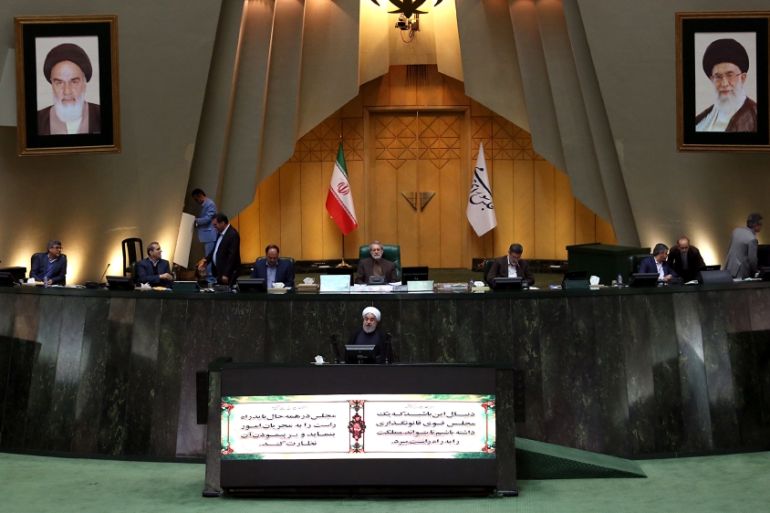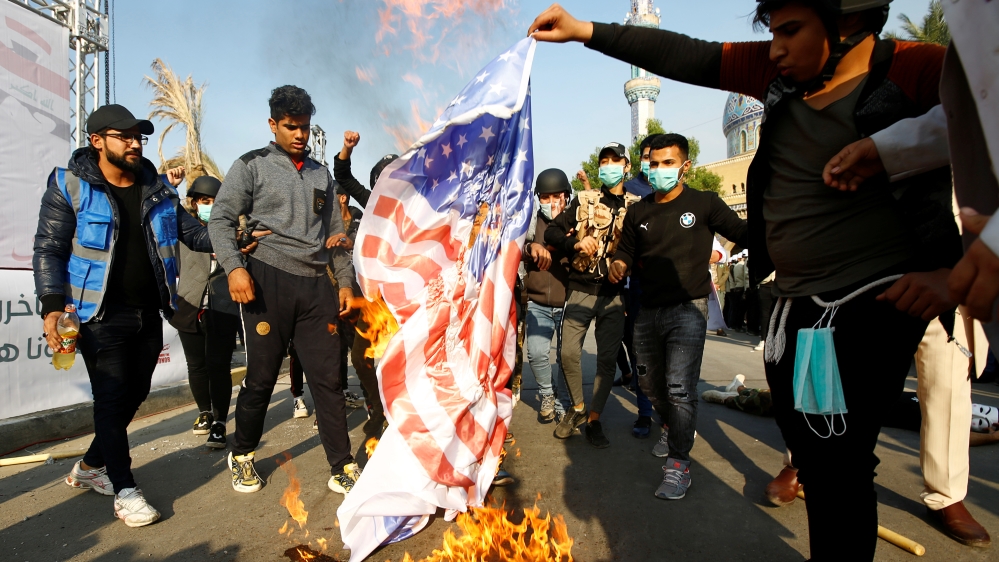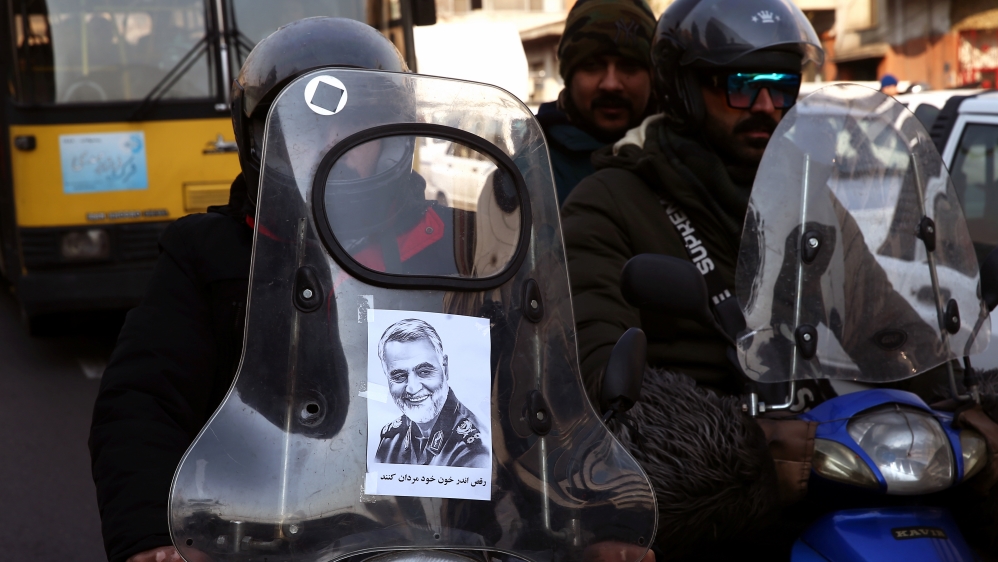Soleimani and the strategic impact of US sanctions on Iran
Iran’s economy has been hammered by sanctions, but did they achieve the US’s stated objective?

On the last day of 2019, Iranian President Hassan Rouhani said that successive rounds of United States sanctions on Iran cost the Islamic Republic $100bn in oil revenue and another $100bn of investment money.
In a televised speech to the nation about what he called an “economic war”, Rouhani blamed the dearth of vital foreign exchange currency on punitive US financial measures on Iran’s oil and banking sectors.
Keep reading
list of 4 itemsExplosions kill dozens gathered for anniversary of Soleimani assassination
Iran blasts updates: Deadly explosions target Soleimani death anniversary
Deadly explosions in Iran during Soleimani anniversary procession
That speech came just weeks after Rouhani proposed a “budget of resistance” to offset the “maximum pressure” campaign unleashed by Washington after President Donald Trump unilaterally withdrew from the Iran nuclear deal with world powers in 2018.
“What should we do?” the Iranian president asked rhetorically. “When there is no food and water, you are still in danger no matter how strong you are.”
Rouhani said Iran is paying a steep price for defying Trump’s will – and that toll could worsen after Trump said during a news conference on Wednesday that the US “will immediately impose additional punishing economic sanctions” in response to Iranian missile attacks on US forces in Iraq.
The Trump administration says the goal of sanctions is to deprive Tehran of the capacity to fund “destabilising” activities and force its leaders back into nuclear discussions.
But the assassination of Quds Force Commander Qassem Soleimani and its aftermath raise important questions about whether sanctions have achieved those objectives – and whether the strategy is still viable.
The maximum pressure campaign has succeeded in squeezing Iran's economy, but it has utterly failed in making Iran change its policies...
‘Maximum resistance’
There is no doubt that sanctions have been effective at pressuring Iran economically.
“Iran experienced the third-largest contraction of any national economy in the world during 2019, something very close to 10 percent,” said Hussein Ibish, senior resident scholar at the Arab Gulf States Institute in Washington.
Iran has run deficits for years, but the government’s fiscal gap widened exponentially as sanctions sent oil sales plummeting 90 percent. The Iranian rial, which lost more than 60 percent of its value in 2018, has only partially recovered.
The Rouhani administration has tried to offset the ravages of sanctions by developing internal markets, cultivating new revenue streams and cutting subsidies – without fomenting a backlash from cash-strapped low- and middle-income people.
Such a dramatic transformation is tough for any country, let alone for one effectively isolated from the global economy and loath to reduce the costly enterprise of cultivating regional influence.
The scramble to refill rapidly depleting coffers has forced tough budget choices on Tehran. Over the summer, the government eliminated universal cash handouts to well-off households.
But the belt-tightening proved too much for ordinary Iranians in November, after a surprise government proposal to ration petrol and hike prices to fund cash benefits for the country’s poorest citizens.
“I wish economic austerity wasn’t only for average people. That way this would hurt less,” wrote a journalist on her Instagram account immediately after a fuel-price hike was announced, shortly after midnight on November 15. “We’re all drowning; it’s only a matter of time.”
The proposal triggered nationwide protests. Blaming “thugs” linked to exiles and foreign adversaries, the government initiated an internet blackout and security crackdown that human rights group Amnesty International said in December resulted in at least 304 deaths. Iran categorically denied the findings.

But cost-cutting is just one of Iran’s responses, say observers. Ibish says Iran’s strategy has evolved – from waiting out sanctions to compelling relief by upping the geopolitical ante for Washington and its allies.
He points to a series of regional attacks attributed to Iran, as well as Tehran’s continued spending on military, security and intelligence, which Ibish says the government prioritises over “the wellbeing of the ordinary people”.
“There is a very direct line of causality between the imposition of the sanctions and the situation in which we find ourselves,” he said, adding that Tehran has tried “to create a political and diplomatic crisis that would result in international intervention to force the US to ease the economic pressure”.
‘Utterly failed’
Analysts are divided on whether Tehran might be willing to renegotiate the terms of the nuclear deal with world powers, the limits of which it has now scrapped.
Ibish believes incremental sanctions relief paired with the possibility of a new accord would be “the most potent positive inducement Washington could offer” to Tehran.
But others believe Iran could be hard-pressed to come to the negotiating table – and stay there – as animosity between the longtime foes deepens.
“Direct diplomacy between Tehran and Trump is all but dead now,” said Annelle Sheline, a research fellow in the Middle East programme at the Quincy Institute for Responsible Statecraft.
“The political realities in Iran will not allow the Iranian government to negotiate directly,” she told Al Jazeera. “Mediation by third countries can help defuse the tensions, but if Trump was looking for a deal, he just ensured he won’t be getting one.”

Sheline believes that Trump’s tactics have brought the US – and the region – closer to war.
“The maximum pressure campaign has succeeded in squeezing Iran’s economy, but it has utterly failed in making Iran change its policies in the direction Washington wants,” said Sheline.
Civilians have been most impacted by higher costs of living, she added, explaining that the general tendency for sanctions is to make a population suffer while the regime remains in place.
‘Bigger division in society’
After the official mourning period for Soleimani ended, Iran took out its revenge on Wednesday by firing missiles at US military bases in Iraq. While Trump promised new sanctions in return, the president also said that the lack of harm to US lives and the minimal damage signal that Iran “appears to be standing down”.
Ibish suggests the US and Iran will likely “return to the low-intensity tit-for-tat of the pre-Soleimani killing era” with Iran potentially seeking a longer pause to “get some economic relief from non-US powers under the circumstances and even to explore what could be possible with neighbouring states”.

But Ali Khadem, an Iranian pro-democracy and human rights activist based in Nuremberg, Germany, is sceptical about the prospects of a US-Iran detente.
“At this stage of escalation, I doubt that Iran would negotiate over economic concerns,” he told Al Jazeera.
However, Khadem said that tighter US sanctions are “leading to a bigger division in society and between the classes, with the people in the middle class shifting to [become] underclass”.
He added that working-class Iranians made up most of those on the streets recently, demanding regime change and, in effect, playing into US hands.
“The biggest concern of the state at the moment is domestic – the high number of unhappy people who are getting ready to use violence, in case there will be another mass anti-regime protest,” Khadem said.